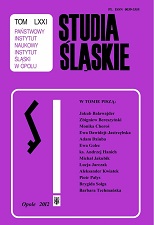Śląsk Opolski i przełom polityczny lat 1970–1971
Opole Silesia and the political breakthrough of the years 1970–1971
Author(s): Zbigniew BereszyńskiSubject(s): History
Published by: Instytut Śląski
Keywords: Opole Silesia; political breakthrogh of years 1970-1971
Summary/Abstract: On the Sunday of 13 december 1970, the state authorities of the Polish People’s Republic an- Sunday of 13 december 1970, the state authorities of the Polish People’s Republic announced their decision on raising prices of food and other consumer commodities. The consequence of the decision was the outbreak of social unrest which had been growing for a long time then in connection with the evident worsening of material living conditions. The incidents on the coast, where the militia and the army used regular weapons against workers, were of especially dramatic character. Among the chief activists in the social protest was Stanisław Słodkowski, a worker of Gdynia Shipyard from Opole Province, who was the leader of the strike committee in the shipyard. The wave of protests also reached Opole Region, where a strike action was organized at the Industrial Installations Factory in Nysa. In various parts of Opole Province leaflets and slogans were appearing, voicing a firm protest against the planned rise in prices. Officers of the Security Service and Citizens’ Militia conducted 1,770 interviews of the preventive-warning character, in total, and ‘isolated’ 337 people for reasons of prevention. For the first time ever in the history of the communist bloc, workers’ protests had led to changes of individual politicians on the highest levels of the party-state authorities. Further protests and other manifestations of the social unrest which were also on the rise in Opole Province, resulted in the withdrawal of the decision on price rise. The breakthrough incidents of the years 1970–1971 contributed to a lasting transformation of the social reality. There followed a temporary improvement of the society’s existence. The period of open confrontation between the communist authorities and the Catholic Church came to an end. The new party-state authorities did not intend to make the political relations more liberal. However, with time, they were forced to do so for reasons of the economic nature and because of the growing activity of the opposition circles in the country.
Journal: Studia Śląskie
- Issue Year: 2012
- Issue No: 71
- Page Range: 229-280
- Page Count: 52
- Language: Polish

